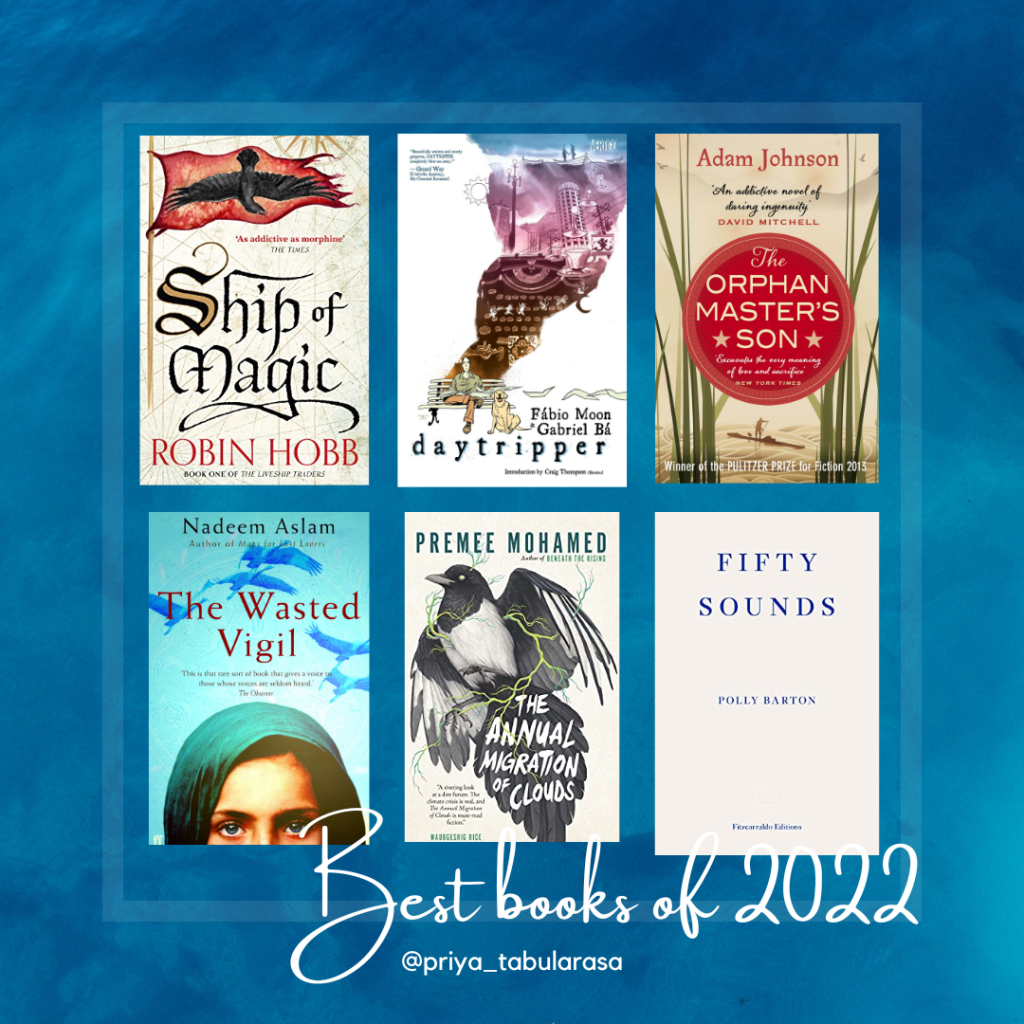I haven’t read as much as I wanted to this year, but I’ve miraculously loved almost all the books that I’ve read. So, quality matters, right? It’s been a good year. Here are the highlights:

Biggest Comfort Read: The Ship of Magic (The Liveships Trilogy) by Robin Hobb
Robin Hobb made my year this year! The Liveship Trilogy by Robin Hobb was the greatest source of warmth, love, and adventure. The incredibly immersive writing made every 900+ page tome a breeze to read.
Robin Hobb’s writing has such a cinematic feel. Every character brought their own charm, and I just wanted to keep reading and see where the pages took them. Highly recommended if you like fantasy, dragons, ships, and sweeping, character-driven stories.
Most Surprising Find: Daytripper by Fabio Moon and Gabriel Ba
I have tried reading graphic novels before but it somehow never stuck. Daytripper was a haunting, beautiful turning point! The story offers glimpses from the life of a Brazilian obituary writer – a man who writes about other lives when he can barely make sense of his own.
What are the moments that matter the most in his life? How will he write his own obituary? The book tells you: the important moments in life are when you’re alive. It’s the only lesson that counts.
Most Layered Read: The Orphan Master’s Son by Adam Johnson
Has a book ever made you feel like you’re travelling through a maze? The back cover says that it’s the story of a North Korean man named Pak Jun Doe, the son of the orphan master, who must escape the orphanage and find his one true love. But that’s not even the tip of the iceberg of what this book offers!
This is one of those novels that are crafted, not just written. North Korea makes for a dreary setting and the dark humor gives you guilty laughs. Hope, when it does peer through, seems like an illusion. I will need time to peel back every layer.
Favourite New Author: The Wasted Vigil by Nadeem Aslam
Which is to say, I’ve spent days devouring interviews and would love to read more of his writing, even though some parts of this book did not fully satisfy me.
The Wasted Vigil by Nadeem Aslam is about five people living in post-9/11 Afghanistan. The writing is deeply metaphorical, ambitious, and emotionally-charged. A quote:
“His shoes are worn the way the edges of erasers become rounded with use. As though he walks around correcting his mistakes.”
Best Accidental Find: The Annual Migration of Clouds by Premee Mohamed
In post-climate disaster Alberta, a woman infected with a mysterious parasite must choose between a rare opportunity to work far from home or help rebuild her community.
The Annual Migration of Clouds by Premee Mohamed moved me to tears in a way that no book has in a long time. There was just something about its innocence and brutality.
It came as a Scribd suggested read and the name and cover intrigued me enough to pick it up. What an amazing find. I do hope the world continues to unravel in a series.
Favourite Non-fiction: Fifty Sounds by Polly Barton
The story of an English-speaking woman who moved to Japan to become a literary translator.
Thought, theory, and ideation corroborate with experience. She writes as a linguist, but also a learner, teacher, and a true translator of cultures and people, along with words. Each chapter represents a sound word and memories she associates with it.
Her writing is candid, chaotic, and often self-deprecating, but I found it easy to relate to, and even in moments when she’s not her best.
~
What have you been reading in the past year?















You must be logged in to post a comment.